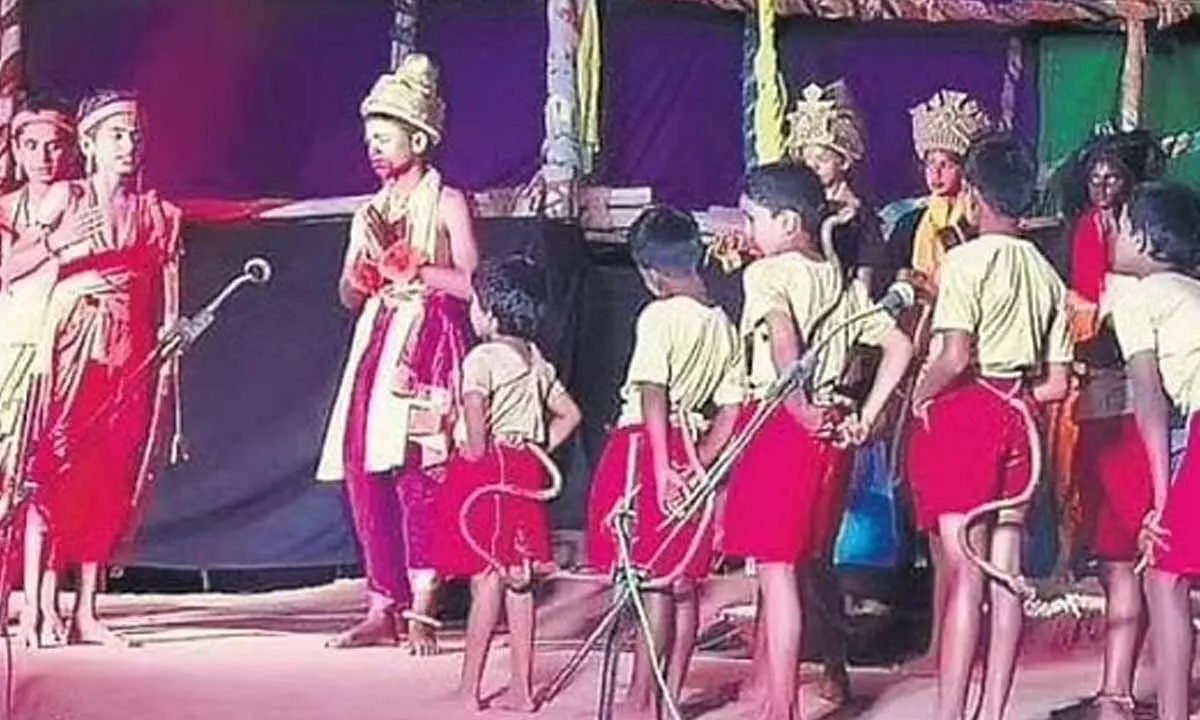Live
- Mumbai, Delhi ranked among top 5 prime residential markets in Asia-Pacific
- Russia provided North Korea with anti-air missiles in exchange for troop deployment
- PCB appoints Azhar Ali as head of youth development
- Deepam-2 Scheme Reaches 5 Million Beneficiaries in Three Weeks, says Nadendla Manohar
- Will RG Kar tragedy impact Bengal bypoll results?
- BGT 2024:25: Josh Hazlewood picks four as Australia bundle out India for 150
- BRS rallies support for Lagacharla ‘victims’
- COP29: Scientists, artists, faith leaders call for greater commitment to delivery of climate finance
- Woman donates liver to husband, saves life
- Mechanic Rocky Review: Thrilling Action Film with Twists and Great Performances
Just In
Man From Mysuru Teaches Tribal Children Theatre Skills And Techniques


Tribal children take part in theatre and folk dance performances
- A 30-year-old man from Mysuru is taking urban theatre to tribal haadis or hamlets and fostering the art form among the local children as a way of going farther and fostering a synthesis between communities.
- The only purpose of the theatre company Rangayaana, which was created in 2014 by Vikas Chandra, is to teach acting and theatre skills to tribal and rural people.
Theatre has improved throughout time in how well it tells societal stories. It is the most prominent artistic indulgence that humanity has ever known. India's theatre scene is as alive as the nation itself, serving as a window into its ethos and culture. A 30-year-old man from Mysuru is taking urban theatre to tribal haadis or hamlets and fostering the art form among the local children as a way of going farther and fostering a synthesis between communities.
The only purpose of the theatre company Rangayaana, which was created in 2014 by Vikas Chandra, is to teach acting and theatre skills to tribal and rural people. It was a fortuitous awakening for Chandra, who as a high school student had observed the filming of a scene for the Vishnu Sene movie, starring Kannada film great Vishnuvardhan, close to his home. Fascinated, Chandra asked one of the young performers how to break into the movie industry. He was told that by enrolling in Kalamandira, a theatre training school, he would have a chance in the film industry.
Chandra, who had no prior experience with theatre, enrolled at Kalamandira and eventually joined the Bharatiya Ranga Shikshana Kendra. He spent five years working in various theatre companies after collapsing in 2009. He made the decision to strike out on his own in 2014, and together with a couple of his coworkers from the Rangayana and Neenasam groups, he created Rangayaana. Although Rangayana and other theatre companies were engaged in a variety of activities, they frequently stayed in cities and hardly ever travelled outside of the taluks.
Chandra addressed Channappa, the assistant director of the Department of Kannada and Culture at the time, with the intention of taking theatre far and beyond. Channappa urged him to teach the art form to youngsters in rural areas. From that point on, Chandra's career took off, and he started working with Adivasi kids, instructing them in the many nuances of acting and other theater-related skills.
He recalled that the initial days were tough as providing training to the children was quite challenging and at the same time taking care of the forest was also a key role. He remarked that the children would offer them fruits that we had never seen before throughout several of these chases. Every fruit in the forest is known to the children, along with its characteristic. His initial task was to mentor the tribal kids enrolled at Ashrama Shaale in DB Kuppe, HD Kote Taluk, near the Karnataka-Kerala border.
In addition, 85 tribal children attended the program. The remaining 40 were trained in kamsale, 35 in folk dance, and 40 in theatre (a brass-made musical instrument). Additionally, the kids were taught how to paint and draw. Chandra and his crew visited Jakkalli Haadi in HD Kote, Shettihalli Haadi in Hunsur, Haavinamoole Haadi in Hanur taluk, and other tribal haadis in BR Hills in Chamarajanagar district following the successful conclusion of the programme at DB Kuppe. The group required the children to perform plays like Bommanahalli Kindrajogi, Mruga Mathu Sundari, and Appa Barthane Hushar, among others, at a number of haadis, including Havinamoole, where firewood was utilised for lighting.

© 2024 Hyderabad Media House Limited/The Hans India. All rights reserved. Powered by hocalwire.com






